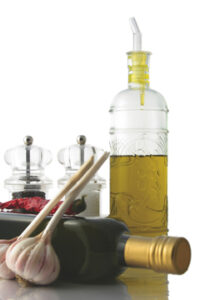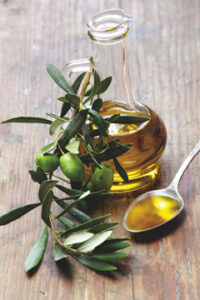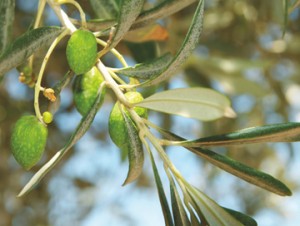Olive Oil: Pour on Golden Goodness
 Over the years, we Americans have loved our fad diets. But fortunately we’re learning more and more about sensible, healthy eating that offers more on the menu than grapefruit and cabbage soup. One diet that has gotten a lot of recent attention is the Mediterranean diet, featuring olive oil as one of its superstar ingredients. Besides being delicious, olive oil is high in monounsaturated fats, which are purported to reduce bad cholesterol without affecting good cholesterol, and it’s also high in antioxidants. According to the U.S. Food and Drug Administration, two tablespoons a day may reduce your chance of heart disease.
Over the years, we Americans have loved our fad diets. But fortunately we’re learning more and more about sensible, healthy eating that offers more on the menu than grapefruit and cabbage soup. One diet that has gotten a lot of recent attention is the Mediterranean diet, featuring olive oil as one of its superstar ingredients. Besides being delicious, olive oil is high in monounsaturated fats, which are purported to reduce bad cholesterol without affecting good cholesterol, and it’s also high in antioxidants. According to the U.S. Food and Drug Administration, two tablespoons a day may reduce your chance of heart disease.
But here’s the challenge for savvy consumers: a trip to the grocery store turns up over 30 different brands—along with another dozen at the specialty food store down the street. How do you decide which one is the one for you? Let me tell you now: There is not one definitive answer, because it depends on several factors, including how and why you plan to use it. It helps to know a few basics when trying to choose the right olive oil.
 Learn the Basics for Easy Shopping
Learn the Basics for Easy Shopping
Olive oil is pressed from olives, and the first press yields the fruity green liquid known as extra virgin olive oil. Additional pressings produce more oil, and the final extraction, in which chemicals and heat are used to expel the final bits of oil, produces something called pomace oil. Olive oil is also graded by acidity: Extra virgin olive oil has acidity of less than .8 percent and generally has a stronger flavor. Virgin olive oil is made from pure olive oil, with acidity of less than 2 percent. Pure olive oil, olive oil and pomace oil are usually a combination of olive oil and refined (pomace) oil. These distinctions may or may not be used in American markets; olive oil and the terms associated with it are not regulated, and producers sometimes include potentially misleading information on the label to increase shelf appeal. With a little time, and some good reading glasses, the type of oil and the country of origin can usually be determined from the back label.
Some olive oils have no discernible taste, while others can taste very strongly of pepper, fruit or green, grassy notes. Olive oil is like wine; everyone has a preference, and to find what that preference is, you need to experiment. Truthfully, olive oil is at its peak the day it’s pressed, and day by day, loses some of its flavor. In fact, some olive oils are sold with a pressing date on the label and are available only for a short time during the spring. Olive oil, like most oils, should be stored only for one year unopened, and about three to six months after opening, in a dark, cool location—so for best results steer clear of the huge jugs at the discount warehouse.
With olive oil, as with most other foods, the more it’s refined, the less of “the good stuff” (flavor and antioxidants) remains. If you are using olive oil strictly for its health benefits, it seems obvious that you should buy oils marked extra virgin or virgin olive oil. Although they are generally more expensive, look for oils that are unfiltered and unrefined.
 Olive oil has cooking benefits too. It has a higher smoke point than some other oils, which means that you can sauté at a higher temperature than other fats like butter without risk of burning. But keep in mind that the special flavors are erased with high heat, so save your more expensive extra virgin olive oils for recipes like pesto, salad dressings or flavored dipping oils in which the taste of the oil is the attraction. One of my favorite dining experiences in Italy was a simple grilled fish, showered with coarse salt and fresh pepper and drizzled with a fresh, peppery extra virgin olive oil—simple but perfect! For cold or low-heat dishes—salad dressings, or for tossing with cooked pasta, dipping crusty bread or drizzling over fish or pizza after cooking—a highly flavored extra virgin oil is definitely worth the price.
Olive oil has cooking benefits too. It has a higher smoke point than some other oils, which means that you can sauté at a higher temperature than other fats like butter without risk of burning. But keep in mind that the special flavors are erased with high heat, so save your more expensive extra virgin olive oils for recipes like pesto, salad dressings or flavored dipping oils in which the taste of the oil is the attraction. One of my favorite dining experiences in Italy was a simple grilled fish, showered with coarse salt and fresh pepper and drizzled with a fresh, peppery extra virgin olive oil—simple but perfect! For cold or low-heat dishes—salad dressings, or for tossing with cooked pasta, dipping crusty bread or drizzling over fish or pizza after cooking—a highly flavored extra virgin oil is definitely worth the price.
Though you can see there are many options, some of them confusing, use these guidelines when shopping. If you are using olive oil for its health benefits, buy extra virgin olive oil all the time. Choose for yourself whether you prefer a mild or heartily flavored oil. If you are using olive oil for cooking, I’d choose a less flavorful oil (but not pomace oil), and then choose another more flavorful oil for finishing.






